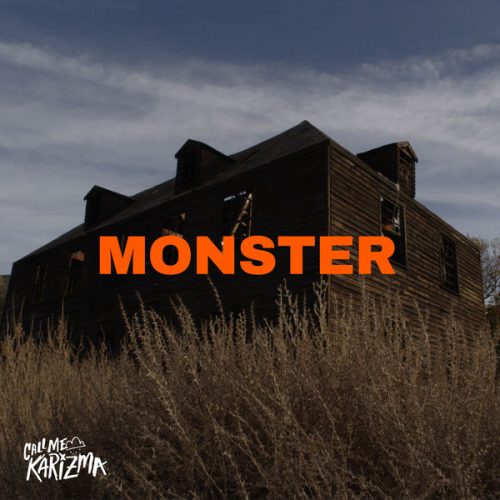You all know what temptation is like, right?
Excellent, because Call Me Karizma’s “Monster” is a song filled with exquisite language and metaphor detailing precisely that. The “Monster,” which takes on an evil connotation, is the mask that temptation wears when gazing into the eyes of our singer.
Opening with the chorus, what follows is a double verse / pre-chorus / chorus pattern. However, the third verse and pre-chorus are combined into a short rap. The interesting part about this formation is the use of instruments. There are two pronounced sounds: acoustic guitar and electronic music. Either one is played alone during the choruses and the verses/pre-choruses, respectively. Yes, there is purpose to this, but let’s look at some of the lyrics first to make sense of it.
The full chorus looks like this:
Monster, monster, under my bed.
Come out and play ‘cause I need a friend.
You’re so damn close that I feel your breath.
You’re the only one I have left.
It is clear that our singer takes comfort in his monster, as he sees him as a friend. Furthermore, his voice changes in tone during the choruses from powerful to soothing.
The pre-chorus is as follows:
But I love when you jump in
and help me feel somethin’.
My blankets are the door,
my bed is the coffin.
And just as it closes,
and I go to lock it,
I sing that lullaby you taught me.
This explains the transition to acoustic guitar and calm vocals from heavy electronic music and forceful vocals in the chorus. The chorus is introduced as a lullaby at each pre-chorus’ end, and as a consequence, the music matches our singer’s voice in its soft quality.
To quickly add, the second time the pre-chorus is sung, “my blankets are the door / my bed is the coffin,” changes to “my eyelids are the door / my mind is the coffin.” The metaphor here is brilliant. The image of pandora’s box pops out at me instantly, as he keeps his monster under lock and key. The first time around, his bed is the box which holds it, and the second time, it’s his own head. What I find the best part to be here is that, in pandora’s box, hope ‒ which is something we all view as a force of good ‒ is the “black sheep” in the cage. Contrarily, our singer seems to be symbolized as a box holding an array of good things, with only one evil existing amongst the others as the odd one out: temptation. Thus, this song completely inverts the Greek myth: instead of rummaging through evil to find hope, he is discarding all the good to find the monster. To many, this evil is good, (in the moment, that is), especially when addressing temptation, which is one of the most deceptive forces of all.
Lastly, I want to bring up the second series of verses:
Show me where to go.
I guess I’m always lost
now that everyone is gone…
You’re the one that gets me home.
Hard to be afraid,
but around you I feel safe.
Going with the theme, he turns to his monster for guidance and safety, which makes sense, considering how temptation sways us into doing its bidding. Regardless, no matter the good or evil and its level (calling the monster temptation is merely my interpretation ‒ it very well may be something else to you), this “monster” is all he has left, since “everyone is gone.” That being said, it’s easy to turn to something unhealthy or on the immoral side of your moral compass when you are left with nothing but your monsters.
And this struggle, that is so eloquently made into a metaphor by Call Me Karizma, is inevitably faced by all of us at one point or another.







